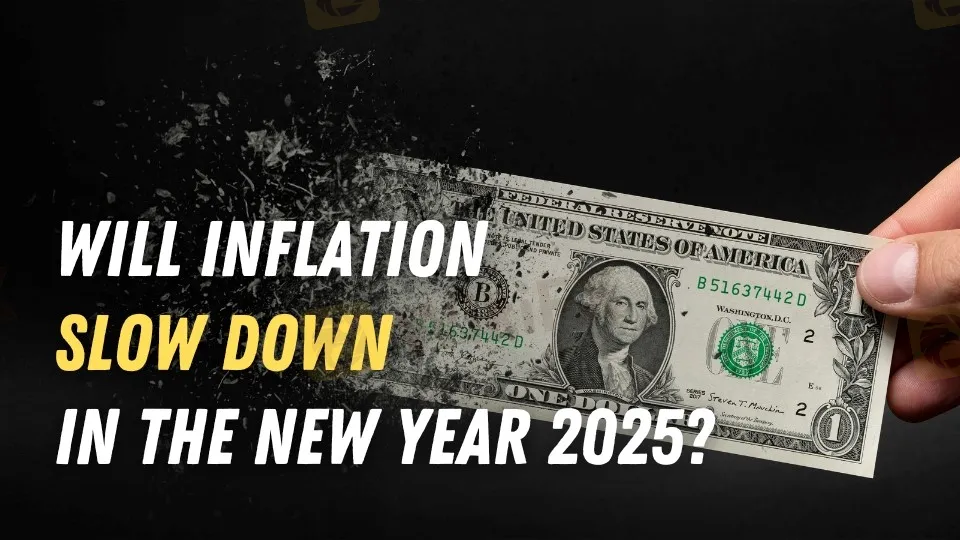Will Inflation Slow Down in the New Year 2025?
Abstract:Will inflation slow down in 2025? Experts weigh in on projections, economic policies, and potential impacts, offering insights into what the new year may hold.

Inflation dominated economic debates in 2024, and analysts say it will be a major worry in 2025. Inflation projections vary greatly, affected by economic policy, global trade dynamics, and consumer behavior. The Federal Reserve and independent economists have provided several projections, providing a complicated picture of the coming year.
Inflation Forecasts for 2025
The Federal Reserve expects core Personal Consumption Expenditures (PCE) inflation to reach 2.5% in 2025, then fall to 2.2% in 2026, and converge with the long-term target of 2% by 2027. Bloomberg polled independent economists, who were slightly less hopeful. While they agree on a 2.5% core PCE inflation rate in 2025, they expect a slower decrease, with inflation settling at 2.4% in 2026.
President-elect Trump's economic proposals, including tariffs on China and other trading partners, probable immigration restrictions, and corporate tax cuts, have been flagged as possibly inflationary. These actions have the potential to aggravate price pressures and delay consumer relief.

Diverging Economic Outlooks
Some analysts, notably Nobel Prize-winning economist Joseph Stiglitz, are more pessimistic. Stiglitz has warned of a potential “inflationary spiral” that could result in retaliatory trade wars, impacting economic development. Similarly, BNP Paribas predicts that inflation will climb sharply from late 2025 to 2026. The Consumer Price Index (CPI) is expected to rise to 2.9% by the end of 2025 and 3.9% by the end of 2026, according to the BNP. The business also anticipates the Federal Reserve to keep interest rates unchanged until 2025, with no monetary easing.
Deutsche Bank shares the BNP's prediction, while other Wall Street firms anticipate two to three rate cuts in 2025, which is more in line with the Federal Reserve's projections. This discrepancy highlights the uncertainties surrounding inflationary trends.
Consumer and Market Effects
Consistent price increases in industries such as housing, insurance, and healthcare are likely to keep consumer spending under pressure. Shelter costs are likely to fall slightly in 2025, but they may stay high, adding to sticky inflation in the services sector. This could result in minimal respite for everyday bills.
There are certain advantages, though. The US economy has exhibited amazing resiliency, with strong growth, healthy consumer spending, and low unemployment rates giving a solid platform for 2025.
Final Thoughts
While estimates vary, the agreement is that inflation will be a significant issue in 2025. Key factors influencing price trajectory include trade policy, labor market developments, and Federal Reserve decisions. As consumers and businesses negotiate the uncertainty of the new year, they will need to keep an eye on these trends.

Read more

Germany's Election: Immigration, Economy & Political Tensions Take Centre Stage
Germany is set to hold a crucial general election on 23 February 2025, with voter frustration over migration emerging as a dominant issue.

ED Exposed US Warned Crypto Scam ”Bit Connect”
The Indian Enforcement Directorate (ED) recently exposed a crypto Scam from a firm called Bitconnect. During the investigation, which took place on February 11th and 15th, 2025. The authority recovered bitcoin worth approximately Rs 1,646 crore & Rs 13.50 Lakh in cash, a Lexus car, and digital devices. This investigation was conducted under the provisions of the Prevention of Money Laundering Act (PMLA) of 2002.

Why Do You Keep Blowing Accounts or Making Losses?
For many traders, consistent losses can feel like an inevitable part of the journey. Some blame the market, others point fingers at brokers, and many convince themselves that luck simply isn’t on their side. But the reality is that repeated trading losses are rarely down to bad luck alone. Instead, a mix of psychological, emotional, and technical factors often leads traders down the path of blown accounts and frustrating setbacks. Understanding these deeper issues is key to breaking the cycle and becoming a more resilient and strategic trader.

Trade War May Escalate, Gold Panic on the Rise
Trump comments on the Russia-Ukraine war, gold rises again to reach a new all-time high.
WikiFX Broker
Latest News
Pi Network Mainnet Launch: Game-Changer or Crypto Controversy?
GlobTFX Users Report Same Issue! But Why?
Rate Cut or Not? It Depends on Trump’s Policies
eToro Adds ADX Stocks to Platform for Global Investors
Why Do You Keep Blowing Accounts or Making Losses?
B2BROKER Launches PrimeXM XCore Support for Brokers
Germany's Election: Immigration, Economy & Political Tensions Take Centre Stage
WikiFX Review: Is IVY Markets Reliable?
WikiFX Community Creator Growth Camp
Effect of Tariffs on Gold and Oil Prices
Rate Calc

